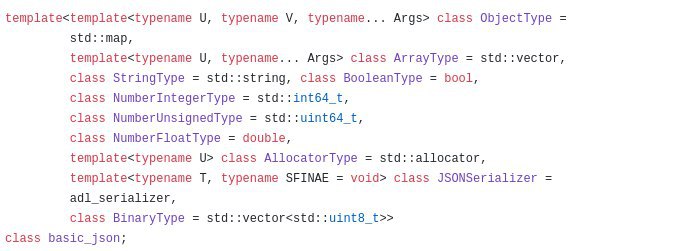P
Size: a a a
2020 June 11
Лол
СК

вот такие темплейты
P
Ша за темплейты
СК
И потом ты на синтаксис шарпа гнал
я и говорил что с цпп история хуже -_-
СК
Ша за темплейты
дженерики в вашем понимании
СК
тока версия пизже
P
дженерики в вашем понимании
Я так и понял, решил уточнить
P
тока версия пизже
Чем?
СК
Чем?
в дженериках ж онли типы данных у нас можно подставлять?
СК
в темплейтах можно хранить некоторую логику
P
Например
СК
и значения которые в компиль тайме подставить можно
СК
Например
логика: смотреть https://en.cppreference.com/w/cpp/header/type_traits
значения в компиль тайме:
значения в компиль тайме:
template <typename T, size_t thrs_n>СК
smth<T, 12>();
CN

Vot krch norm mishka, kak vam?
СК
яб взял
P
The following are the key differences between C# Generics and C++ templates:
C# generics do not provide the same amount of flexibility as C++ templates. For example, it is not possible to call arithmetic operators in a C# generic class, although it is possible to call user defined operators.
C# does not allow non-type template parameters, such as template C<int i> {}.
C# does not support explicit specialization; that is, a custom implementation of a template for a specific type.
C# does not support partial specialization: a custom implementation for a subset of the type arguments.
C# does not allow the type parameter to be used as the base class for the generic type.
C# does not allow type parameters to have default types.
In C#, a generic type parameter cannot itself be a generic, although constructed types can be used as generics. C++ does allow template parameters.
C++ allows code that might not be valid for all type parameters in the template, which is then checked for the specific type used as the type parameter. C# requires code in a class to be written in such a way that it will work with any type that satisfies the constraints. For example, in C++ it is possible to write a function that uses the arithmetic operators + and - on objects of the type parameter, which will produce an error at the time of instantiation of the template with a type that does not support these operators. C# disallows this; the only language constructs allowed are those that can be deduced from the constraints.
C# generics do not provide the same amount of flexibility as C++ templates. For example, it is not possible to call arithmetic operators in a C# generic class, although it is possible to call user defined operators.
C# does not allow non-type template parameters, such as template C<int i> {}.
C# does not support explicit specialization; that is, a custom implementation of a template for a specific type.
C# does not support partial specialization: a custom implementation for a subset of the type arguments.
C# does not allow the type parameter to be used as the base class for the generic type.
C# does not allow type parameters to have default types.
In C#, a generic type parameter cannot itself be a generic, although constructed types can be used as generics. C++ does allow template parameters.
C++ allows code that might not be valid for all type parameters in the template, which is then checked for the specific type used as the type parameter. C# requires code in a class to be written in such a way that it will work with any type that satisfies the constraints. For example, in C++ it is possible to write a function that uses the arithmetic operators + and - on objects of the type parameter, which will produce an error at the time of instantiation of the template with a type that does not support these operators. C# disallows this; the only language constructs allowed are those that can be deduced from the constraints.
N
Zowie)
P
Чувк G502 стоит 4к
СК
The following are the key differences between C# Generics and C++ templates:
C# generics do not provide the same amount of flexibility as C++ templates. For example, it is not possible to call arithmetic operators in a C# generic class, although it is possible to call user defined operators.
C# does not allow non-type template parameters, such as template C<int i> {}.
C# does not support explicit specialization; that is, a custom implementation of a template for a specific type.
C# does not support partial specialization: a custom implementation for a subset of the type arguments.
C# does not allow the type parameter to be used as the base class for the generic type.
C# does not allow type parameters to have default types.
In C#, a generic type parameter cannot itself be a generic, although constructed types can be used as generics. C++ does allow template parameters.
C++ allows code that might not be valid for all type parameters in the template, which is then checked for the specific type used as the type parameter. C# requires code in a class to be written in such a way that it will work with any type that satisfies the constraints. For example, in C++ it is possible to write a function that uses the arithmetic operators + and - on objects of the type parameter, which will produce an error at the time of instantiation of the template with a type that does not support these operators. C# disallows this; the only language constructs allowed are those that can be deduced from the constraints.
C# generics do not provide the same amount of flexibility as C++ templates. For example, it is not possible to call arithmetic operators in a C# generic class, although it is possible to call user defined operators.
C# does not allow non-type template parameters, such as template C<int i> {}.
C# does not support explicit specialization; that is, a custom implementation of a template for a specific type.
C# does not support partial specialization: a custom implementation for a subset of the type arguments.
C# does not allow the type parameter to be used as the base class for the generic type.
C# does not allow type parameters to have default types.
In C#, a generic type parameter cannot itself be a generic, although constructed types can be used as generics. C++ does allow template parameters.
C++ allows code that might not be valid for all type parameters in the template, which is then checked for the specific type used as the type parameter. C# requires code in a class to be written in such a way that it will work with any type that satisfies the constraints. For example, in C++ it is possible to write a function that uses the arithmetic operators + and - on objects of the type parameter, which will produce an error at the time of instantiation of the template with a type that does not support these operators. C# disallows this; the only language constructs allowed are those that can be deduced from the constraints.
sfinae))



